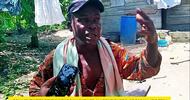From a a palm oil plantation run by a Malaysian company, Sime Darby, the Today programme's Evan Davis looked into whether lands deals are a route into better life, or a signing away of the nation's wealth.
Des représentants communautaires provenant des quatre coins du Liberia se sont réunis du 27 au 29 novembre dans la ville de Bopolu, dans le Comté de Gbarpolu, afin d'examiner les répercussions des activités des concessions agricoles d’huile de palme au Liberia sur des terres déjà utilisées et détenues (de façon coutumière ou autre) par les communautés.
Over 150 community representatives from four counties in Liberia gathered to discuss their experiences and concerns regarding the impact of oil palm plantations on their livelihoods and communities.
A case study of Sime Darby operations in Liberia by Sophie Chapelle
Citizens at a conference in Bopolu expressed strong opposition to planned oil-palm development by Sime Darby in Gbarpolu County.
- FrontPageAfrica
-
02 December 2012
Major farmland investors such as banks and pension funds must stop facilitating land grabs, civil society groups on the eve of a global farmland investment conference in London on December 3-5, have said.
- AkanimoReports
-
30 November 2012
The government allocated some 350.000 hectares to Sime Darby, a Malaysian multinational. But people only came to know about this deal when the company showed up to take their land.
The Liberian government has leased nearly 6 per cent of Liberia’s total land mass to palm-oil companies. More than a million people live on those lands, and 150,000 will be affected in the first five years of the plantations.
- Globe and Mail
-
27 September 2012
A group calling itself the Greater Tarsue Community of Butaw, Sinoe County, Liberia has strongly protested what they refer to as illegal land grab by Equatorial Palm Oil Company.
- FrontPageAfrica
-
24 September 2012
A new report by the Liberian NGO Sustainable Development Institute presents testimonies of people affected by Sime Darby operations in western Liberia and highlights the fears of others where the company plans to expand in the coming years.
“We need to be growing at the rate of 10,000 hectares a year to be economically viable, which is not happening,” says Sime Darby official. “Securing land has been a gruelling process.”
- New Republic
-
14 September 2012
Overview of the palm oil sector in West Africa - major players (Siva, SIAT, Sime Darby, SIFCA, Bolloré, Olam...), hectarage under foreign corporate control, etc.
- Hardman & Co
-
06 August 2012















